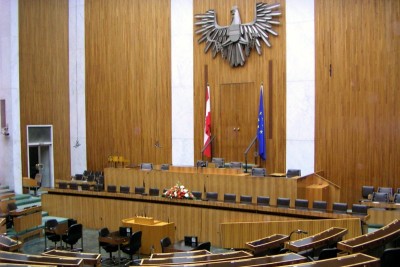Austrian Politics Between Neutrality and Security Policy
A heated political climate is currently shaping the political debate in Austria, where the FPÖ and other political groups in parliament are debating the issues of neutrality, security policy, and the right approach to current crises.
 At a special session of the National Council demanded by the FPÖ, there was broad support for Austria's neutrality. / Picture: © Wikimedia Commons/ Peter Binter/ CC BY-SA 2.0 (https://creativecommons.org/licenses/by-sa/2.0)
At a special session of the National Council demanded by the FPÖ, there was broad support for Austria's neutrality. / Picture: © Wikimedia Commons/ Peter Binter/ CC BY-SA 2.0 (https://creativecommons.org/licenses/by-sa/2.0)
Austria's State Secretary Claudia Plakolm of the Austrian People's Party (ÖVP) accused the FPÖ of trying to "stir up fear and uncertainty" among the population without any concrete basis. She stressed the "overwhelming consensus" regarding Austria's neutrality and assured that there were no plans to abolish it. Plakolm stressed that neutrality does not mean not having an opinion on world political events and emphasized Austria's political support for victims of terrorist attacks and attacks that violate international law. She also stressed the need for defense neutrality and referred to the increase in the army budget and joining the Sky Shield missile defense system as measures to strengthen national defense.
Defense Minister Klaudia Tanner also commented on the debate, stressing the importance of providing the Armed Forces with the necessary means to protect the population. She thanked MPs for the funding increases in the army budget and stressed the importance of cooperation to deal with crises.
The ÖVP sharply criticized the FPÖ for its stance, accusing it of polarization, division, and lack of constructive contributions to crisis management. Christian Stocker of the ÖVP described the FPÖ as far-right and accused it of advocating isolationism and withdrawal from the EU. He also stressed the importance of not jeopardizing Austria's international reputation.
For its part, the SPÖ accused the Freedom Party of untrustworthy policies and recalled the party's historic positions against neutrality and in favor of joining NATO. The Social Democrats emphasized their long-standing support for a neutral Austria and criticized the FPÖ for its stance on current international conflicts.
The FPÖ defended its position and stressed the importance of neutrality, especially in times of war. They accused the government of undermining Austria's neutrality through its security policy and accession to the Sky Shield. The Freedom Party also criticized the government's counterterrorism measures and warned against denigrating its electorate.
The Greens argued for an active foreign and defense policy within the framework of the European Union and stressed the importance of the EU for Austria's security. They accused the FPÖ of being a "neutrality traitor" and stressed the importance of anchoring neutrality in the constitution. Finally, the NEOS advocated strengthening the EU's common security and defense policy and building a European army.
Overall, the debate revealed the deep political divides in Austria, especially about issues of neutrality, security policy, and the right approach to current crises. While the Austrian People's Party (ÖVP) and its allies argued for a defense-oriented neutrality and a strong national defense, the Freedom Party criticized these approaches and stressed the importance of an independent and active neutrality policy.



